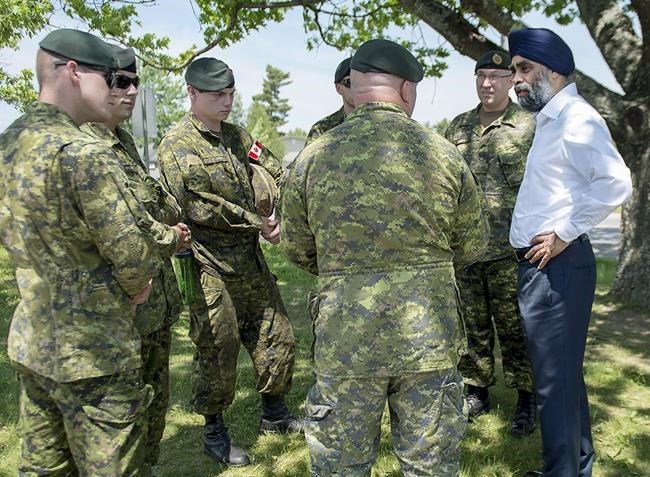
Defence Minister Harjit Sajjan talks with soldiers after announcing investments in infrastructure for the 5th Canadian Division Support Base at CFB Gagetown in Oromocto, N.B. on Monday, June 27, 2016. Defence Minister Harjit Sajjan says sick and injured soldiers will be allowed to stay in the military until their pensions and veterans' benefits are in place. THE CANADIAN PRESS/Andrew Vaughan
Republished June 12, 2017 - 1:02 PM
Original Publication Date June 12, 2017 - 10:21 AM
OTTAWA - Defence Minister Harjit Sajjan says sick and injured soldiers will be allowed to stay in the military until their pensions and veterans' benefits are in place.
The commitment comes as part of the Trudeau government's new defence policy, which the Liberals unveiled last week with promises to better care for Canada's men and women in uniform.
It is also a direct response to complaints from numerous ill and injured military personnel who say they were forced out of the Armed Forces too fast and left to fend for themselves.
That includes having to wait months for their first pension cheques to arrive, and struggling to access the benefits and services owed them by Veterans Affairs.
"No member is going to be released until all of their benefits are in place, that their pension cheque is ready to go," Sajjan told reporters following an event in Halifax on Monday.
"This is something that we as a government and the Canadian Armed Forces takes very seriously."
Approximately 1,800 service members are forced out of the military every year because of medical conditions that have made them unable to fulfil their duties.
Many are struggling with psychological injuries sustained while in uniform; documents obtained by The Canadian Press last year showed PTSD as the top diagnosis for those at risk of being forced to release.
Veterans advocates say the challenges many of those men and women have faced in getting benefits, services and even their pension after leaving the military have made their move to civilian life even harder.
One of those is military ombudsman Gary Walbourne, who in the past three years has received hundreds of complaints from ill and injured troops.
Walbourne has been pressing the federal government and military for years to hold onto personnel until their pensions and benefits are lined up, and was cautiously optimistic about the commitment.
But he said he wants to see the specifics, including a directive from the military's top brass making the commitment an order.
"What I haven't seen is a policy suite or a directive to put that in force," Walbourne said. "I see a lot of positive things, but the devil is in the details."
Maj.-Gen. Wayne Eyre, deputy commander of Military Personnel Command, said the Forces has already started holding onto some ill and injured personnel to stop people from "falling through the gaps."
But more work needs to be done as part of an overall improvement to the way service members transition from the military to civilian life, he said, within some of the limitations that exist.
Those include the fact pension cheques can't flow until a service member retires, Eyre said, and much of the work setting up services for injured members involves provincial health care systems.
"So there's some challenges there," Eyre said.
The Liberal government's new defence policy promises $62 billion in additional spending on the military over the next 20 years, including a 70 per cent increase in annual funding over the next decade.
While most of that money will be spent on equipment, including 88 fighter jets and 15 warships, the government has also promised to improve services and support for military personnel and their families.
Walbourne said such improvements are necessary if the military, which has struggled in recent years with recruitment and retention, is to remain strong and capable of fulfilling its mandate.
— with reporting from Michael MacDonald in Halifax.
— Follow @leeberthiaume on Twitter.
News from © The Canadian Press, 2017